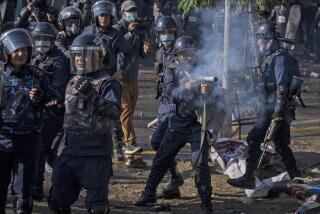Democracy Takes Hold in Himalayan Kingdom : Nepal: Everyone wants an airplane. And everyone wants a say in drawing up the new constitution.
- Share via
KATMANDU, Nepal — Daman Dhungana figures George Washington & Co. had it easy: Nobody asked America’s founding fathers about airplanes and fertilizer.
Not so in Nepal.
“When we ask people in the villages what they want in our new constitution, all they say is airplanes,” Dhungana said with a sigh. “Everyone wants an airfield and an airplane. Plus seeds and fertilizer. How can we write that into the constitution?”
It’s no idle question. Nearly 10,000 suggestions have flooded the nine-member commission struggling to write a new constitution by Sept. 1 for this tiny Himalayan kingdom.
Groups from the Girl Scouts to the army and villagers from the slopes of Mt. Everest to the steamy lowland jungles all have offered advice on how Nepal should shift from one of the world’s last absolute monarchies to a parliamentary democracy with a figurehead king.
“Every group wants to be named and get something in the constitution,” complained Bishwa Nath Upadhayay, a Supreme Court senior judge who presides over the commission. “We didn’t know we had so many organizations.”
Still, the public outpouring is powerful evidence that democracy has taken root with a vengeance in one of the world’s poorest countries, four months after police shot and killed nearly 100 protesters as they marched on King Birendra’s opulent palace. The king later yielded most of his power.
“It’s like a dawn after 30 years of darkness,” said Bhikkhu Sushobham, a saffron-robed Buddhist monk who marched against the king. “Before, we lived in fear of going to jail. Now, people are giving speeches, criticizing problems, speaking their minds. We are free.”
More than 1,000 political prisoners were released from dungeon-like jails, some after 15 years. At least 35 political parties have emerged. Newspapers print what they want for the first time.
On a recent afternoon, several dozen students cheerfully chanted and waved picket signs by the palace to demonstrate their concern about the civil war in distant Sri Lanka. Shopkeepers ran outside just to cheer the passing parade.
“We were never allowed to demonstrate before,” a tailor explained with a grin.
The interim government, a coalition of the long-outlawed centrist Nepali Congress Party and the Communist United Left Front has promised national elections for a new Parliament next April. An election commission is already preparing Nepal’s first computerized voter lists.
“We have made great progress so far,” the prime minister, Krishna Prasad Bhattarai, said in an interview. “After all the turmoil, we are returning to normalcy.”
Bhattarai, whose teeth are blackened from chewing betel nut, holds office in a white, 1,400-room, wedding cake of a former palace called Singha Durbar. A huge tiger skin, complete with teeth, guards the prime minister’s floor. Bureaucrats snooze at empty desks down the hall.
Indeed, normalcy is relative in a North Carolina-size kingdom that is home to the world’s highest mountains and 18 million of its poorest people. Most live in grim contrast to romantic notions of an idyllic Shangri-La.
Most are illiterate subsistence farmers, working rocky soil on impossibly steep slopes. Doctors and schools are often days away. At least 250 people have died this summer of dysentery and diarrhea caused by poor sanitation. Another 1,800 have cholera.
Despite a growing tourist trade, most of Katmandu behind the hotels and trekking shops looks like medieval Europe: muddy paths wind between dark buildings, barefoot laborers bend double under giant burdens, ill-clad children play by open sewers.
“In the absence of real economic development, democracy is utterly irrelevant to most Nepalis,” said Trailokya Nath Uprety, vice chancellor of Tribhuvan University.
And the economy, based largely on tourism and $400 million a year in foreign aid, is reeling from a 15-month trade embargo by neighboring India. The embargo ended in June, but prices of rice, tea, kerosene and other necessities remain high.
“Now, everything is expensive,” complained Chamar Lama, 18, pausing briefly while touting tourists at the temples on Durbar Square. Still, his pay at a carpet factory has doubled to $1 a day since April. “That is from democracy,” he said happily.
Whatever it is, so far it’s working. The 37,000-strong army has stayed in the barracks. There has been no communal violence. Several weeks of bloody anti-police reprisals that followed the April massacre during the march on the palace have mostly subsided.
“This was all billed as a life-and-death struggle,” said one Western diplomat. “But it’s evolved as a very civilized process.”
That is all the more remarkable because of persistent tales of corruption and intrigue that swirl around the king’s wife, Aishwaraya, and key members of the royal court.
“She’s considered a cross between Mrs. (Ferdinand E.) Marcos and Mrs. (Nicolae) Ceausescu,” another diplomat said with a laugh. “She’s really painted as the witch.”
If the king’s powers are reduced, his presence certainly is not. Wearing thick black glasses and a stern look, the Eton- and Harvard-educated monarch appears on every rupee, indeed, on all currency notes.
Unsmiling photos of the king and queen command every office and hotel lobby. Two life-size portraits even oversee the dingy city hall conference room where the constitution commission gathers to chart the new democracy.
Commission members say King Birendra, now 45, will stay as a constitutional monarch, with powers and privileges similar to the kings of Denmark or the Netherlands, when the draft constitution is finished next month.
Change is already apparent. The king no longer uses the high form of Nepali to speak down to visitors. “We don’t feel so uncomfortable anymore,” said Upadhayay, the commission chairman.
A British-style Parliament will be established, with an independent judiciary. Nepal’s deeply divided Communist factions--at least 20 now compete--are expected to form a loyal opposition.
How to transfer power before the Parliament is elected is still unclear. So is religion. In the past, the world’s only Hindu kingdom banned religious conversion, and police arrested Christian ministers for alleged proselytizing. Some now fear that ancient rivalries between Hindus and Buddhists could erupt as well.
“We have not decided what to do about religion,” said Upadhayay. “But it will not be a secular state. The moment we declare a secular state, we would have religious riots.”
For now, the clock is ticking. The Philadelphia framers took just shy of four months to write the U.S. Constitution in 1787. Nepal’s commission has only three.
Members began in June by visiting the 75 rural districts for public meetings. Constitutional experts flew in from Denmark, the United States and West Germany. Nepali lawyers jetted off to London, Tokyo and New York. Legal and civic groups sponsored their own seminars in mountain huts and open fields.
The San Francisco-based Asia Foundation sent a legal library full of ideas, including two 17-volume, leather-bound sets of “The Constitutions of the Countries of the World,” with sample documents from Afghanistan to Zimbabwe.
India’s was discarded first. “It’s the world’s longest,” said Surya Dhungel, a lawyer working with the commission. “It has more than 400 articles and 542 amendments.”
The U.S. Constitution, by comparison, is one of the shortest. It has only seven articles and 26 amendments.
Denmark donated a recording system to Nepal to preserve and transcribe the framers’ deliberations. Two computers and a Nepali-language program were also sent to log the 10,000 public comments and recommendations for future reference.
Despite the progress, many fear for the future. Criticism is growing from both the left and right.
“From a human-rights perspective, things have improved tremendously,” said Kusum Shrestha, head of the Nepal Law Society. “But people cannot live only with human rights. They have to see economic change. And that has not happened yet.”
“Disappointment is growing,” warned Pashupati S. Rana, a longtime member of the king’s Cabinet. “The potential for violence is very great.”
Nonsense, responds Bhim Bahadur Tamang. The Congress Party leader and former political prisoner says democracy will survive in this long-oppressed, long-mysterious mountain kingdom.
“The whole world is changing,” he added with a smile. “So is Nepal.”
More to Read
Sign up for Essential California
The most important California stories and recommendations in your inbox every morning.
You may occasionally receive promotional content from the Los Angeles Times.














